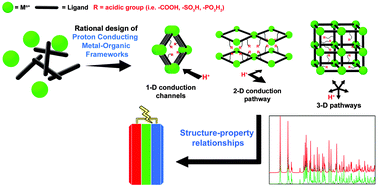MOFs as proton conductors – challenges and opportunities
Abstract
Proton conducting materials have garnered immense attention for their role as electrolytes in fuel cells. Metal Organic Frameworks (MOFs) and coordination polymers have recently been investigated as possible candidates for proton-conducting applications. Their crystallinity, chemically functionalizable pores and options for systematic structural variation are some of the factors that allow for the targeted design of better proton conductors operating over a wide variety of temperatures and/or humidity conditions. This review will examine selected examples from this nascent field, and will focus on the design and synthesis of proton conducting MOFs, their properties and conditions under which they operate.

- This article is part of the themed collection: Metal Organic Frameworks (MOFs)

 Please wait while we load your content...
Please wait while we load your content...